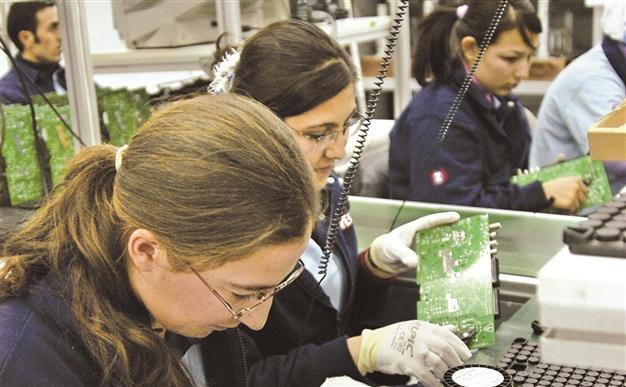Gov’t to hit breaks as IMF cuts global growth forecast
ANKARA / ISTANBUL

Turkish government plans to slow down the economy and cut the inflation rate. DAILY NEWS photo
he Turkish government has revised its 2013 growth target down to 4 percent, signaling that the slowdown policy will continue next year. The medium term program revealed by Deputy Prime Minister Ali Babacan yesterday at a press meeting in Ankara also put the year-end inflation target at 7.4 percent.In addition to a 1 percent cut in the 2013 growth target, the program expects the country to grow 3.2 percent this year, which is 0.8 percent below the earlier forecast. This approaches the IMF forecast also revealed yesterday, which projected 2012 growth at 3 percent, 2013 growth at 3.5 percent.
Babacan said yesterday that the government expected the year-end current account deficit to drop to 7.3 percent and this figure to decrease to 6.5 percent at the end of 2015.
The medium-term framework suggests that Prime Minister Recep Tayyip Erdoğan, who has said he would like to see real interest rates of zero percent to stimulate growth, ultimately sided with the government’s more cautious economic wing. Erdoğan has made strong growth a priority and is keen to maintain that reputation as elections loom.
The budget deficit was expected to come in at 2.3 percent of GDP this year, above the government’s original 1.5 percent target, and to decrease only marginally next year. Finance Minister Mehmet Şimşek, who accompanied Babacan at yesterday’s meeting, said this was due to improvements in social security and changes in local administrations that increase the number of metropolitan municipalities. “We have not made a budget of war or election,” he said.
An election cycle
Economist Erdal Sağlam said that workers and public servants may not receive salary increases and Erdoğan’s possible moves to boost the economy in a bid to net votes at the upcoming elections may pose risks. However, Reuters quoted several economists as saying that the government was simply moving into an election cycle.
“This program covers the next three years when Turkey faces local, presidential and parliamentary elections, plus a likely referendum on constitutional reform,” said Timothy Ash, head of emerging markets research at Standard Bank. “In my mind, given the backdrop of elections, this looks like a prudent and very credible set of targets,” he said.
Özgür Altuğ, an economist at Istanbul-based BGC Partners, said the revised forecasts were appropriate: “It appears that budget balances will remain relatively expansionary compared to previous forecasts … Besides, they are still below the related Maastricht criterion of 3 percent.”
















